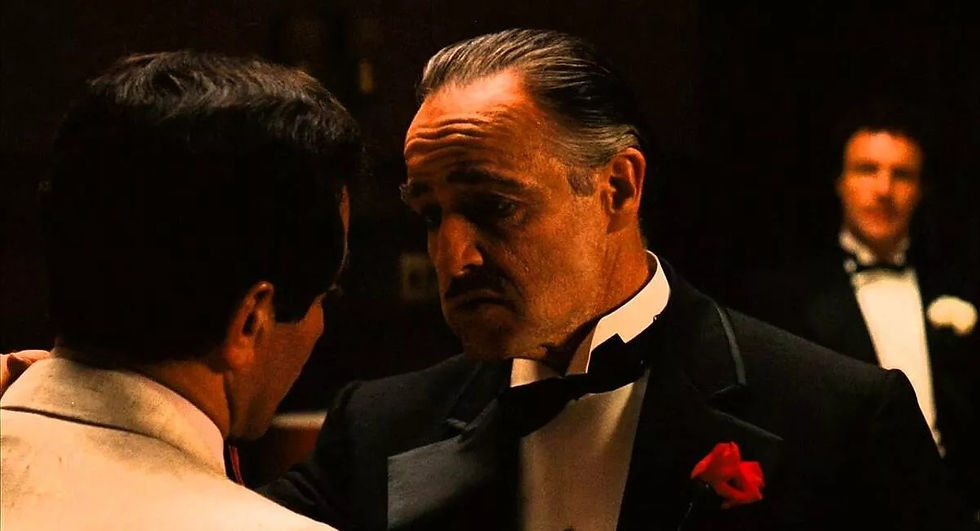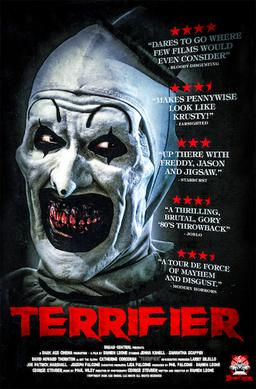The Godfather (1972) review
- Jeremy Kelly
- Mar 24, 2022
- 5 min read
The Godfather (1972)
Directed by: Francis Ford Coppola
Produced by: Albert S. Ruddy
Screenplay by: Mario Puzo, Francis Ford Coppola
Starring: Marlon Brando, Al Pacino, James Caan, Richard Castellano, Robert Duvall, Sterling Hayden, John Marley, Richard Conte, Diane Keaton

With the 94th Academy Awards coming up this weekend—rooting for you, “Nightmare Alley”—I wanted to review a Best Picture winner, so how about one celebrating a very special anniversary? Fifty years ago today, the gangster film genre was changed forever with the release of Francis Ford Coppola’s “The Godfather.” Based on the novel by Mario Puzo—who co-wrote the screenplay—this film broke the common trend at the time by making the gangsters the protagonists—ones that were complex and nuanced. Back in the 1930s, the introduction of the Hays Code required all criminal action in film to be punished, which made gangster films pretty scarce for a while. When the code was finally abolished in the late ‘60s, Hollywood began to broaden its horizons with crime dramas like “Bonnie and Clyde,” “Mean Streets” and this. The story of the New York-based Sicilian Corleone mob family is one of the most renowned in film history, and remains a cinematic landmark through brilliant writing, gorgeous set pieces and passionate performances.
The film takes place between the 1940s and early ‘50s; Vito Corleone (Marlon Brando) is the aging patriarch— a.k.a. the Don—of the family, a man of respect that takes requests on the day of his daughter Connie’s (Talia Shire) wedding. But after refusing business with other families—who are resorting to tactics he finds unsavory—he’s targeted for assassination; he survives, albeit in poor condition, leaving the operations to Vito’s eldest son Sonny (James Caan). Meanwhile, his youngest son Michael (Al Pacino), initially an outsider just home from World War II, seeks retribution in the face of increasingly ruthless tactics. An all-out crime war occurs, splintering the Corleone family as well as the balance of Vito’s old-fashioned values and the modern cruel realities, with Michael gradually ascending as the new Don.
Marlon Brando was one of the most influential performers in Hollywood; reportedly, he was one of the first to bring the Stanislavski system of acting, more commonly known as method acting, into the mainstream. It’s a more naturalistic style, sort of an attempt by the actor to think and feel like the character instead of just rehearsing lines and responding to “Action!” However, this contributed to Brando being infamously difficult to work with; I’m not going to get into all the stories about him, but after the troubled productions of “One-Eyed Jacks” and the remake of “Mutiny on the Bounty,” his career had been on a decline throughout the ‘60s. But his performance as Vito launched him back to the top in a truly iconic effort; his puffy cheeks and soft voice nevertheless create a terrific aura about this character. Warm and understanding towards his loved ones but cold and calculating at the first sign of disrespect, you understand his commitment yet struggle to adapt to a time that’s leaving his ways of doing things behind. Brando received the second Oscar of his career, but notably rejected the award, in the midst of boycotting the ceremony as a protest against Hollywood’s portrayal of Native Americans.

In contrast to reviving Brando’s career, this movie is also credited with jump-starting a young Al Pacino’s career. Though not his first film role, this is the one that made most people take notice; there are a lot of actors that try to bring high intensity to a role by just being shouty and over-the-top. But Pacino has a naturally engaging energy about him; so it feels like a genuine transition watching Michael, previously detached from the crime side of the family, find a more cutthroat side of himself when his family is threatened. He’s become regarded as one of the most interesting characters ever put to film, and Pacino plays him with the perfect amount of pathos. For the rest of the ‘70s, Pacino was on fire, collecting five Oscar nominations, although it took until “Scent of a Woman” two decades later to finally get the gold.
So not only do we have Pacino as a future star, but a lot of fantastic rising talents; there’s Robert Duvall as Tom Hagen, the family lawyer, Diane Keaton as Kay, Michael’s savvy girlfriend and eventual wife, and Abe Vigoda as Tessio, a high ranking syndicate member. All three were relative newcomers in the industry; Duvall was a familiar name in supporting roles, but they would become Hollywood mainstays as character actors. They each bring tremendous gravitas to their situations; nobody ever feels too clueless about what’s happening, even if sometimes they put on the appearance that they are. Even that’s barely scratching the surface; this movie and the sequel have some of the best casts in film history. The only performance I feel is undervalued—and he would tell you the same thing—is James Caan as Sonny. There should be more to this character, yet we don’t get enough sense of how he runs the family except through outside exposition; apparently, a lot of his scenes were cut for time, which he wasn’t at all happy about. Nevertheless, the performance shines through; Caan, Duvall and Pacino all received Oscar nominations, although none of them won.

Aesthetically, the film hits all the right notes; the costumes, the locations and the music by Nino Rota create a beautifully classy vibe, presented to a tee by Coppola. Paramount Pictures apparently wanted something authentically Italian, and he certainly delivers. It’s a tricky thing for a film to humanize people who do bad things, but when it works, it’s so effective because of how it pulls you into their world and lets you witness how their actions reflect on society. The opening “I believe in America” monologue personifies how systems advertised and designed to help can be exploited, leading to more desperate circumstances. It’s subtle, outstanding writing by Puzo, who went on to win Best Adapted Screenplay; all throughout the film—nay, the entire trilogy—there are many gems in the dialogue, which never gets too pretentious or self-important. Even though the movie is three hours long, you don’t feel the length; you’re always taken in by the scale and weight of the visuals, particularly the scenes in Sicily. Rota, meanwhile, was nominated for Best Original Score; however, it was rescinded upon the discovery that one of his tracks had been used in a previous film. Regardless, this is a film you could watch on mute or in black-and-white and still find it engaging. It’s kind of a brilliant mesh of ironies; it’s well-versed but dirty, polite yet violent, a pat on the back with a bullet to the head.
Overall, “The Godfather” is just one of those films you’re going to find very little “wrong” with. It’s a matter of how much you enjoy certain aspects compared to others. It’s not my personal favorite gangster—look to “Goodfellas” for one more up my alley—but there’s no denying the craft, personality or how it truly changed the future of cinema. Receiving 11 total Oscar nominations, it inspired a whole new trend of mob films, and is today regarded among the greatest movies ever made. Two years later, “The Godfather Part II” was released, and is one of the rare sequels that is considered as good, if not better, than the original; then in 1990, there was another sequel that got much less acclaim. Nevertheless, the first two films are still regarded as all-time classics; in fact, there’s an upcoming TV miniseries called “The Offer” about the making of the first movie, slated for release next month on Paramount Plus. I know the Oscars have received countless scrutiny over the years—much of it justified—but at the very least, you can call it the highest-profile recommendation show. Some Best Picture winners are deserved, some aren’t—“Dances with Wolves” over “Goodfellas”? Really?—but there are still great stories to bring attention to; this is one where almost everyone agrees they got it right. So give it a watch if you haven’t; it’s an offer you can’t refuse.
My rating: 9/10





Comments